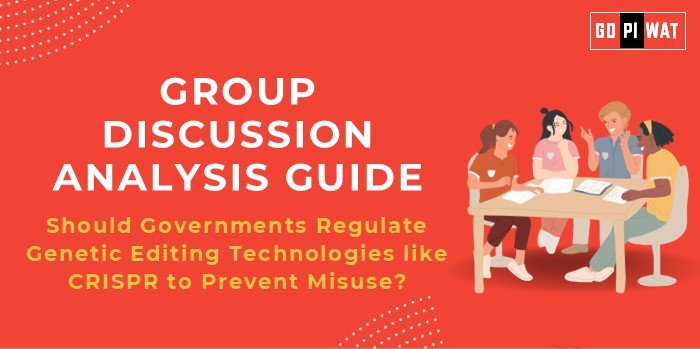📋 Group Discussion Analysis Guide: Should Governments Regulate Genetic Editing Technologies like CRISPR to Prevent Misuse?
🌐 Introduction to the Topic
- 🔍 Opening Context: Genetic editing technologies, particularly CRISPR-Cas9, have revolutionized biotechnology and medicine, enabling precise edits in DNA. However, ethical concerns and potential misuse have prompted calls for regulatory oversight.
- 📜 Topic Background: Discovered in 2012, CRISPR has opened avenues in treating genetic disorders, agriculture, and synthetic biology. However, fears of designer babies, bioterrorism, and unintended ecological consequences necessitate balanced governance.
📊 Quick Facts and Key Statistics
🧬 First CRISPR Human Trials (2016): Used to treat cancer patients, marking a milestone in medical innovation.
💰 Cost of CRISPR Edits: Reduced to under $1,000 per gene, making it highly accessible.
🌍 Global Usage: Over 70 countries are conducting CRISPR-related research.
⚠️ Ethical Breach (2018): He Jiankui’s gene-edited babies in China sparked a global debate on regulations.
💰 Cost of CRISPR Edits: Reduced to under $1,000 per gene, making it highly accessible.
🌍 Global Usage: Over 70 countries are conducting CRISPR-related research.
⚠️ Ethical Breach (2018): He Jiankui’s gene-edited babies in China sparked a global debate on regulations.
🛠️ Stakeholders and Their Roles
- 🌍 Governments: Create regulations to ensure ethical practices and safety protocols.
- 🎓 Scientific Community: Conduct research responsibly, adhering to ethical standards.
- 🏢 Private Biotech Firms: Drive innovation while complying with regulations.
- 📢 Citizens and Ethical Bodies: Advocate for transparency and ethical considerations.
- 🌐 International Organizations: Establish global norms and prevent jurisdictional misuse.
🏆 Achievements and Challenges
✨ Achievements
- 🏅 Medical Breakthroughs: Successful treatment of sickle cell anemia and certain cancers.
- 🌾 Agricultural Revolution: Drought-resistant and pest-resistant crops are being developed.
- 📚 Research Advancements: Over 20,000 CRISPR-related scientific papers published annually.
⚠️ Challenges
- ⚖️ Ethical Concerns: Potential for misuse in creating designer babies or harmful pathogens.
- 💸 Access Inequality: High costs limit benefits to affluent societies.
- 🌍 Regulation Disparity: Different countries have varied stances on CRISPR use, leading to potential loopholes.
🌎 Global Comparisons:
✅ Strict Regulation (EU): Prohibits genetic modification in embryos except for research purposes.
✅ Open Approach (USA): Encourages CRISPR use but monitors safety and ethical compliance.
🧪 Case Study: China’s lax oversight led to unauthorized gene-editing experiments in humans.
✅ Strict Regulation (EU): Prohibits genetic modification in embryos except for research purposes.
✅ Open Approach (USA): Encourages CRISPR use but monitors safety and ethical compliance.
🧪 Case Study: China’s lax oversight led to unauthorized gene-editing experiments in humans.
📄 Structured Arguments for Discussion
- 🟢 Supporting Stance: “Regulation ensures safety, ethical compliance, and prevents potential misuse, such as bioterrorism.”
- 🔴 Opposing Stance: “Excessive regulation can stifle innovation and slow down lifesaving research advancements.”
- ⚪ Balanced Perspective: “A middle path with flexible but robust regulations encourages innovation while ensuring safety.”
🗣️ Effective Discussion Approaches
- 📊 Opening Approaches:
- 🧬 “CRISPR technology’s transformative potential comes with ethical dilemmas, making regulation a pressing issue.”
- 📚 “The 2018 gene-editing controversy in China highlights the need for global consensus on regulations.”
- 🔄 Counter-Argument Handling:
- 📈 If innovation concerns arise: “Regulations can include innovation-friendly clauses to ensure progress.”
- ⚖️ For ethical issues: “Global ethical standards are essential to protect vulnerable populations and biodiversity.”
🔍 Strategic Analysis of Strengths and Weaknesses
- 💪 Strengths: Precise gene-editing capabilities, cost-effectiveness, wide applicability.
- ⚠️ Weaknesses: Ethical challenges, accessibility concerns, lack of global consensus.
- 🌱 Opportunities: Address genetic diseases, enhance food security, foster global cooperation.
- 🚨 Threats: Bioterrorism, ecological risks, public mistrust.
🎓 Connecting with B-School Applications
- 🌟 Real-World Applications:
- Research projects in ethical technology governance.
- Business models for biotech firms balancing innovation with compliance.
- ❓ Sample Interview Questions:
- “How can CRISPR technology transform healthcare?”
- “What are the risks of unregulated genetic editing?”
- 💡 Insights for Students:
- Explore the balance between innovation and ethics.
- Study the global regulatory landscape for emerging technologies.


